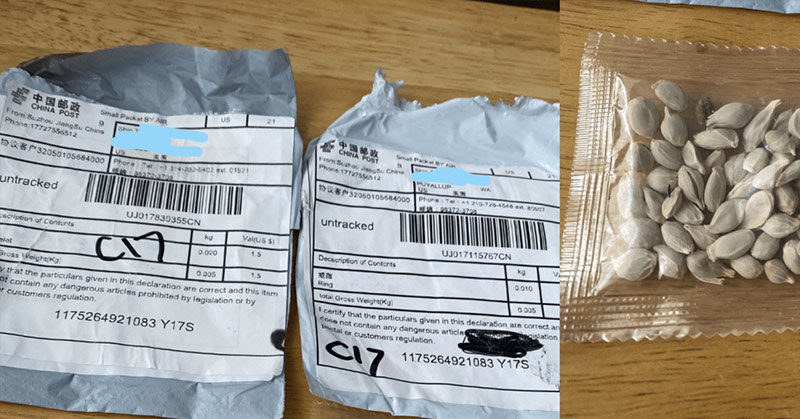Getting a surprise package in the mail is usually exciting, but recently Americans have been receiving packages that are more confusing than anything else.
Residents in several states have reported receiving unsolicited packages of seeds that appear to be coming from China, and officials are now asking residents to contact them if they receive one of these mystery packages.
USDA Warning Against Mystery Seeds
The USDA in multiple states has now issued warnings about these unsolicited shipments of foreign seeds, and have instructed people not to plant them over the concern that these seeds, which appear to have come from China, could be an invasive plant variety that could damage the environment [1].
The USDA released a statement on July 28 that contained the following:
“USDA is aware that people across the country have received suspicious, unsolicited packages of seed that appear to be coming from China. USDA’s Animal and Plant Health Inspection Service (APHIS) is working closely with the Department of Homeland Security’s Customs and Border Protection, other federal agencies, and State departments of agriculture to investigate the situation.” [2]
There have been reports of these mysterious packages in more than a dozen states, including Kentucky, North Carolina, Florida, and New York.
“We don’t know what they are, and we cannot risk any harm whatsoever to agricultural production in the United States,” said agricultural commissioner Ryan Quarles. “We have the safest, most abundant food supply in the world and we need to keep it that way.” [3]
An Undetermined Motive
Quarles added that as of now, officials do not have sufficient information to determine whether this was simply a prank, an internet scam, or an act of bio-terrorism. For the time being, they believe that this is likely nothing more than a “brushing scam”, in which people receive unsolicited items from a seller, who then posts a false customer review to boost sales [1].
“According to the Better Business Bureau, foreign, third-party sellers use your address and Amazon information to generate a fake sale and positive review to boost their product ratings,” said Phil Wilson, director of the North Carolina Plant Industry Division [1].
Whatever the reason, officials are concerned that planting these seeds could introduce non-native plants into the local environment, which could have devastating consequences.
“Invasive species wreak havoc on the environment, displace or destroy native plants and insects and severely damage crops. Taking steps to prevent their introduction is the most effective method of reducing both the risk of invasive species infestations and the cost to control and mitigate those infestations,” The Virginia Department of Agriculture and Consumer Services said in a statement [4].
What to Do if you Receive Seeds
The Washington State Department of Agriculture has identified these packages as instances of agricultural smuggling, and have given the following instructions to anyone who receives one of these packets:
1) DO NOT plant them and if they are in sealed packaging don’t open the sealed package.
2) This is known as agricultural smuggling. Report it to USDA and maintain the seeds and packaging until USDA instructs you what to do with the packages and seeds. They may be needed as evidence [4].
New York Commissioner of Agriculture Richard Ball has advised any resident who receives a package to leave them sealed, to store them safely away from children and pets, and to email the USDA immediately at [email protected] with their full names and phone numbers, pictures of the packaging, and any other information that may be of importance [1].
The USDA has since urged anyone who receives one of these packages to contact their state plant regulatory official or APHIS state plant health director, who will then contact them with further instructions. During this time they should keep the seeds, packaging, and mailing label.
Until they are able to determine the motive behind these seed packages, as well as what type of seeds they are, US officials have one primary instruction to all American citizens: do not plant the seeds.
Keep Reading: She’s a model citizen, but she can’t hide in China’s ‘social credit’ system

